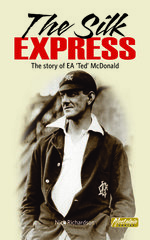The Silk Express
Martin Chandler |Published: 2015
Pages: 211
Author: Richardson, Nick
Publisher: CricketBooks.com.au
Rating: 4 stars

The appearance of this title on my doorstep recently goes to prove that, just occasionally, you do get what you wish for. I was told some time ago Nick Richardson had written a biography of Ted McDonald, and have on more than one occasion used the site to bemoan his inability to find a publisher for what sounded like as exciting a project as a cricketing biography could produce. So kudos to Ken Piesse for taking a punt on The Silk Express, and may he sell out the 300 copies printed by Easter at the latest.
There is of course always a scintilla of doubt in these situations – surely I can’t be the only person who has appreciated just how fascinating the handsome, brooding and in many ways downright mysterious McDonald is. So perhaps the simple truth was that Richardson couldn’t find out anything about him that history had not already recorded, or possibly that his book was, not to put too fine a point on it, crap. I did therefore have a brief crisis of confidence before opening The Silk Express and briefly thought I might await someone else’s review before I started on it.
In the end though I took the plunge, and am extremely pleased I did. The depth of Richardson’s research shows just what can be achieved by spending more than a quarter of a century on a project. There is a hugely impressive list of sources at the end of the book and as far as I can see Richardson missed just one, a meticulously prepared monograph by Gerry Wolstenholme about McDonald’s tragic death that was published in 2012. There are matters of detail in Wolstenholme’s account that might have been referred to in The Silk Express, but nothing substantive.
Before getting on to the book itself the whole production deserves a mention. The paper quality is excellent and the illustrations, despite the antiquity of the source material, are reproduced sharply and clearly. There is an excellent statistical appendix and a good index. A biography without those two things can be extremely frustrating, yet still they appear on occasion with neither. I would have preferred something bound in plain buckram with a dust jacket, rather than the boards the reader in fact gets, but there is none of the feeling of “doing things on the cheap” that is the impression boards generally create.
To return to the Dark Lord himself he was of course a fast bowler, one half (with Jack Gregory) of the first great pairing of speed merchants. He came from Tasmania, and then moved to Victoria before, once peace resumed after the Great War, becoming the scourge of England batsman in the back to back series of 1920-21 and, more particularly 1921. That however, for Australians at least, was almost the end of the McDonald story. He played three Tests in South Africa on the way back to Australia at the end of the 1921 Ashes but then returned to England.
For Lancastrians the move to England was the beginning of our chapter of the McDonald story. The Red Rose hasn’t won very many County Championships, the Manchester rain thwarting many a promising summer, but there were four wins in the six full campaigns McDonald led the attack, and what we have always had are the descriptions of McDonald that flowed from the pen of Neville Cardus.
The hazy aspects of MacDonald’s life have been the question of why he left Tasmania, or more particularly precisely what cloud he was under at the time, as well as why he didn’t return to Australia after the 1921 series. The road accident in which he met his death was also a story only half known, at least until Wolstenholme’s effort provided much information that had previously been missing.
Does Richardson answer the questions? The answer is certainly yes, and while some matters of detail are still absent at least the basic answers are now known, with the exception of just one. Why did McDonald’s two sons both always believe their father had served in the Great War when he clearly did not? The answer must of course have been that their parents created and then perpetuated the myth for them, but why they should have done so? Absent some long lost cache of letters being found in the future that one will have to remain a matter for speculation.
The real strength of The Silk Express is that it is a proper attempt at a biography rather than simply a book recounting the life of a cricketer. That may sound like a distinction without a difference, but the point I am making is that Richardson does manage to unravel and explain some of the complexities of the McDonald persona, rather than simply explain and put in context his significance to the game of cricket. The fact its subject is such an interesting man means the book is an absorbing read, and highly recommended.
Copies of The Silk Express can be purchased from Cricket Web’s friend Ken Piesse http://www.cricketbooks.com.au/






Leave a comment